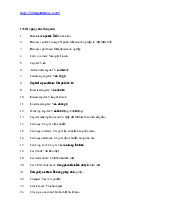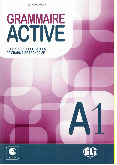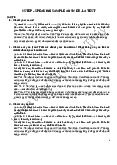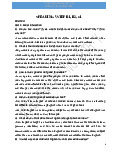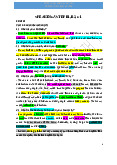


Preview text:
Hurricanes and Storms
Wreaking (tiến hành /riːk/) Havoc (sự tàn phá / ˈhæv.ək/) Around the World
This fall, four areas of the world were simultaneously inundated (tràn ngập / ˈɪn. n.de ʌ
ɪt/) by massive storms which caused damage from high
winds, widespread flooding and often mudslides (lở đất /ˈmʌd.slaɪd/). South Asia
was hit in August by torrential (cuồn cuộn, xối xả /təˈren.ʃəl/) rains, inundating
Nepal, Bangladesh, and India. The countries of the Congo, Niger, Sierra Leone,
and Nigeria and later South Africa also received massive amounts of rain causing
flooding and mudslides with thousands of dead or missing people. Meanwhile the
U.S., Mexico and the Caribbean Islands were hit hard by hurricanes. The science of hurricanes
Hurricanes are ocean-originated storms comprised of winds of 74 mph (119
km/hr) or more. The terms hurricane, cyclone (lốc, gió xoáy / sa ˈ .klə ɪ ʊn/) or
typhoon are all used for the same kind of storm in different parts of the world.
These storms happen when warm ocean water evaporates (bay hơi /ɪ
ˈvæp.ər.eɪt/) into the air above, its warmth being converted from heat energy to
the mechanical (cơ học) energy of moving air. Once in the air it is water-
saturated (bão hòa /ˈsæt . ʃ ər.e .t
ɪ ɪd/) wind that forms a funnel shape.
Anthropogenic (chịu tác động của con người / æn.θrə.pə ˌ d ˈ en. ʒ ɪk/)-induced
climate change (due to livestock (thú nuôi /ˈla v
ɪ .stɒk/) agricultural practices
and fossil fuel use) has contributed greatly to warmer air and warmer oceans.
Warmer air holds more moisture (hơi ẩm / m ˈ s.t ɔɪ ə
ʃ r/) and warmer oceans not
only evaporate faster, but also expand, causing rising sea levels (which are also
caused by increased glacial melt). This contributes to “storm surges” in which
waves reach higher into the infrastructure (cơ sở hạ tầng /ˈɪn.frə ˌstr k.t ʌ ə
ʃ r/) along coastlines, sometimes breaching levees (phá vỡ đê /bri t ː ʃ
ˈlev.i/), and, along with high winds, often causing the most damage.
Yet this year’s hurricanes are neither more in number nor more intense, on
average, than previous years. There is much variability (tính thay đổi /ˌveə.ri.ə ˈb l.ə. ɪ
ti/) in hurricanes from year to year, having to do with natural
climate fluctuations (sự dao động / fl ˌ k.t ʌ ʃu e ˈ .
ɪ ʃən/) such as El Niño and simply
chance. There was also very little wind shear to break up storms this season, so
they gained huge dimensions (kích thước / da ˌ men. ɪˈ
ʃən/) and sustained very high
wind speeds as they made landfall (cập bến). Deaths and damage
On the U.S. mainland (lục địa, đất liền / me ˈ n.læ ɪ
nd/) death tolls (sự mất mát,
sự thiệt hại /təʊl/) varied, with the highest being from Hurricane Irma of early
September at 90. Direct property damage is estimated at $200 billion from
Hurricanes Harvey (Texas), Irma (Caribbean, Florida), Jose (Caribbean, New
England), and Maria (Caribbean). On Caribbean island-nations including the
U.S. territories (lãnh thổ / ter ˈ . .t
ɪ ər.i/) of the Virgin Islands and Puerto Rico, some
of these hurricanes scoured (càn quét, quét sạch /ska ə
ʊ r/) whole landmasses
(lục địa, đất liền / lænd.mæ ˈ
s/), rendering (làm, làm cho / ren.də ˈ r/) Barbuda
“practically uninhabitable (không thể ở, không thể cư trú /ˌʌn. n ɪ
ˈhæb.ɪ.tə.bəl/),” according to Prime Minister Gaston Browne, with 90% of structures destroyed.
Puerto Rico, with its population of 3.4 million, was first hit by Category
5 Hurricane Irma in which over a million people lost power, and merely (chỉ /
ˈmɪə.li/) two weeks later it was hit again by Category 4 Hurricane Maria. This time
the power system was essentially (hầu như / sen. ɪˈ
ʃəl.i/) completely destroyed, as
well as much of the island’s infrastructure. Beyond the initial death toll of 16,
Puerto Rico’s toll has continued to climb (phát triển, tăng lên /klaɪm/) due to
lack of services at hospitals and throughout its communities. People were and still
are running out of water and food and those already in poor health are succumbing
(không chịu nổi, không chống nổi, chết /sə k
ˈ ʌm/) to the high, humid heat of the
late summer. The official death toll now stands at 55, but funeral homes (nhà tang lễ / fju ˈ .n
ː ər.əl/) recently reported 499 hurricane related deaths to CNN.
Climate change, hurricanes, and the future
To date (cho tới bây giờ), the U.S. National Oceanic and Atmospheric
Administration (NOAA) states that scientists cannot be sure that human activities
have yet caused a detectable (có thể nhận thấy, có thể nhận ra /dɪˈtek.tə.bəl/)
impact on Atlantic hurricane or global tropical cyclone activity. Yet they predict
that this will change by the end of the 21st century.
NOAA states that by the end of the 21st century, anthropogenic-caused climate
change likely will cause tropical cyclones globally to be more intense (and
destructive) on average, and have substantially (đáng kể /səb stæn. ˈ ʃəl.i/) higher
rainfall rates (more specifically, there is greater than a 66% chance of this
happening). Furthermore they assert (khẳng định /ə s
ˈ ɜːt/) that it’s likely that
there will be an increase in the occurrence of very intense tropical cyclones in some of the world’s basins.
Scientists have said for decades now that prudent (thận trọng, cẩn thận /
ˈpruː.dənt/) measures to limit the damage of climate change are imperative (cấp bách, khẩn thiết / m ɪ per ˈ
.ə.tɪv/). Such measures are yet to happen. Moreover, the
decision by President Trump of the United States (a main contributor to climate
change) to pull out of the Paris Climate Accord is a huge setback for this pressing
issue in which time is of the essence (thời gian là cốt yếu).
(Nguồn: Enews, Hurricanes and Storms Wreaking Havoc Around the World)
